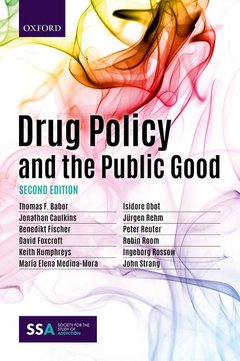Description
Drug Policy and the Public Good (2nd Ed.)
Authors: Babor Thomas, Caulkins Jonathan, Fischer Benedikt, Foxcroft David, Humphreys Keith, Medina-Mora María Elena, Obot Isidore, Rehm Jürgen, Reuter Peter, Room Robin, Rossow Ingeborg, Strang John
Language: English
Subject for Drug Policy and the Public Good:
61.80 €
In Print (Delivery period: 21 days).
Add to cart
Publication date: 07-2018
400 p. · 15.7x23.4 cm · Paperback
400 p. · 15.7x23.4 cm · Paperback
Description
/li>Biography
/li>
Illegal psychoactive substances and illicit prescription drugs are currently used on a daily basis all over the world. Affecting public health and social welfare, illicit drug use is linked to disease, disability, and social problems. Faced with an increase in usage, national and global policymakers are turning to addiction science for guidance on how to create evidence-based drug policy. Drug Policy and the Public Good is an objective analytical basis on which to build global drug policies. It presents the accumulated scientific knowledge on drug use in relation to policy development on a national and international level. By also revealing new epidemiological data on the global dimensions of drug misuse, it questions existing regulations and highlights the growing need for evidence-based, realistic, and coordinated drug policy. A critical review of cumulative scientific evidence, Drug Policy and the Public Good discusses four areas of drug policy; primary prevention programs in schools and other settings; supply reduction programs, including legal enforcement and drug interdiction; treatment interventions and harm reduction approaches; and control of the legal market through prescription drug regimes. In addition, it analyses the current state of global drug policy, and advocates improvements in the drafting of public health policy. Drug Policy and the Public Good is a global source of information and inspiration for policymakers involved in public health and social welfare. Presenting new research on illicit and prescription drug use, it is also an essential tool for academics, and a significant contribution to the translation of addiction research into effective drug policy.
Thomas Babor Professor and Chairman, Department of Community Medicine and Health Care, Health Net, Inc., Endowed Chair in Community Medicine and Public Health, University of Connecticut School of Medicine, Farmington, Connecticut, United States of America Jonathan Caulkins Stever University Professor of Operations Research and Public Policy, Carnegie Mellon University, Heinz College, Pittsburgh, Pennsylvania, United States of America Benedikt Fischer Senior Scientist, Institute for Mental Health Policy Research, Centre for Addiction and Mental Health (CAMH), Toronto, Canada; Professor, Department of Psychiatry, Institute of Medical Science, and Centre for Criminology and Sociolegal Studies, University of Toronto, Toronto, Canada David Foxcroft Professor of Community Psychology and Public Health, Oxford Brookes University, Oxford, United Kingdom Keith Humphreys Research Career Scientist, Department of Veteran Affairs; Professor of Psychiatry, Stanford University, Palo Alto, California, United States of America María Elena Medina-Mora General Director, National Institute on Psychiatry Ramon de la Fuente Muniz, Mexico City, Mexico Isidore Obot Professor of Psychology, University of Uyo; Director, Centre for Research and Information on Substance Abuse (CRISA), Uyo, Akwa Ibom State, Nigeria Jürgen Rehm Senior Scientist and Director, Institute for Mental Health Policy Research, Centre for Addiction and Mental Health (CAMH), Toronto, Canada; Professor and Chair, Addiction Policy, Dalla Lana School of Public Health, University of Toronto, Toronto, Canada Peter Reuter Professor, School of Public Policy and Department of Criminology, University of Maryland, College Park, Maryland, United States of America Robin Room Professor, School of Population Health, University of Melbourne, Melbourne, Australia; Director, AER Centre for Alcohol Policy Research, Turning Point Alcohol and Drug Centre, Fitzroy, Australia; Professor, Centre for Social Research on Alcohol and Drugs, Stockho
© 2024 LAVOISIER S.A.S.




